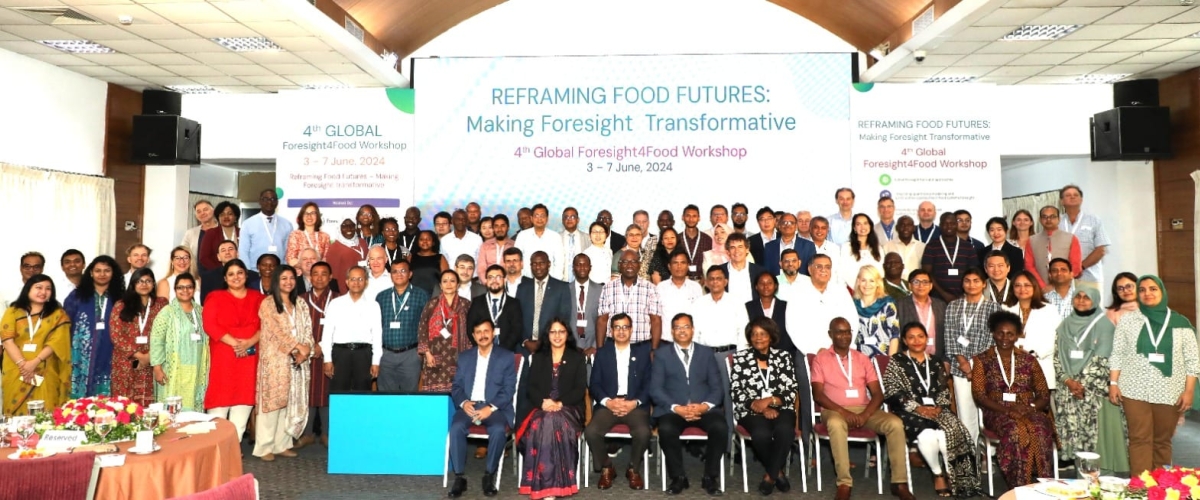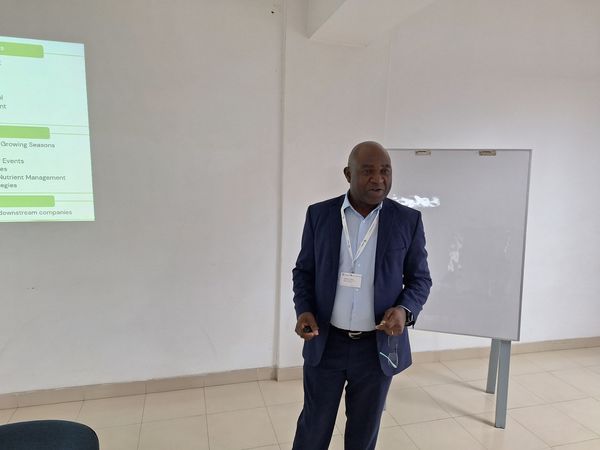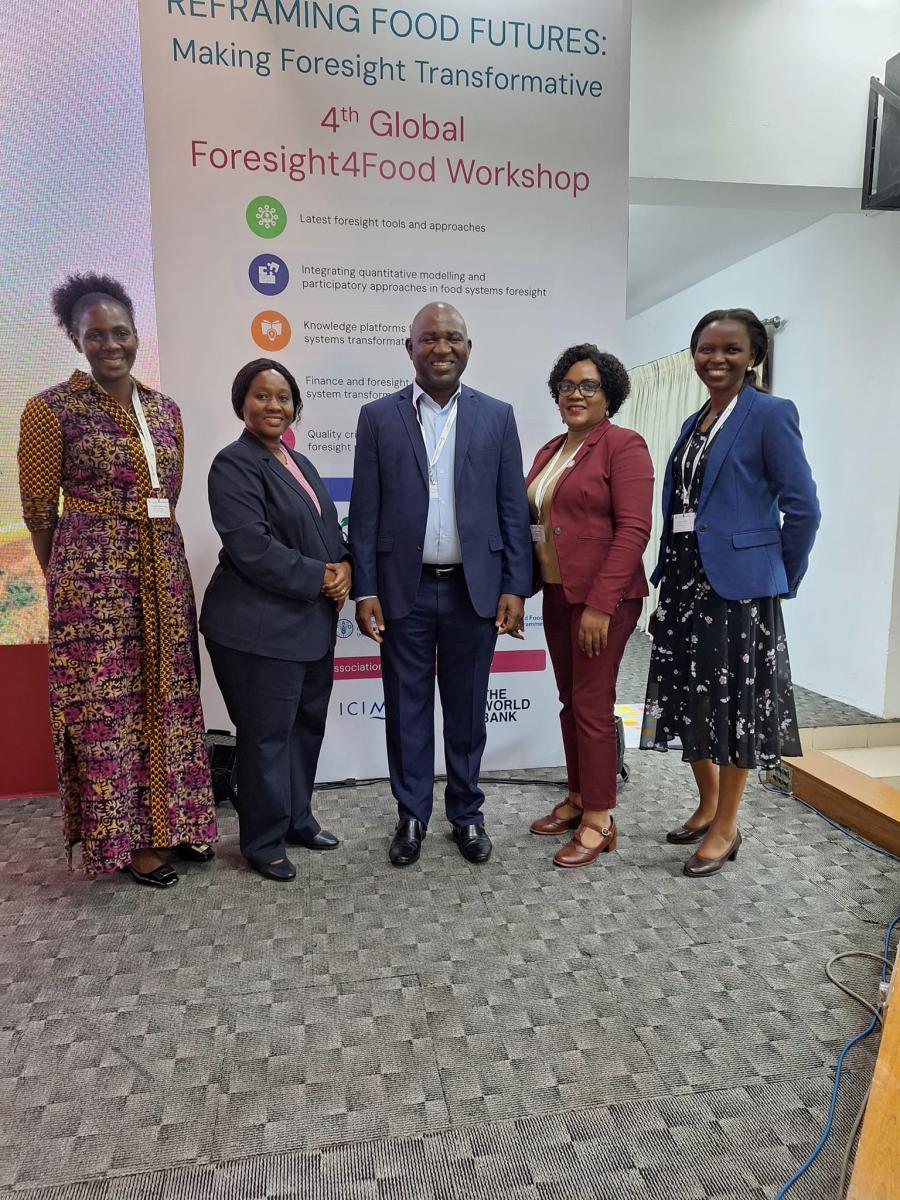
The Centre for Coordination of Agriculture Research and Development for Southern Africa (CCARDESA), under its CAADP-XP4 Programme with support from the European Union, recently took part in the 4th Global Foresight4Food workshop from 3rd -7th June 2024, held in Dhaka, Bangladesh, themed "Reframing Food Futures: Making Foresight Transformative."
In his keynote speech, Jim Woodhill, lead of the Foresight4Food Initiative at Oxford University, addressed global challenges such as food insecurity, noting that a significant portion of the population is affected. He warned that poor diets could cost the global economy nearly 3% of its wealth annually by 2035. Woodhill emphasized the need for a collective commitment to using foresight methodologies to drive system changes that align with national and global priorities, fostering nutrition-resilient communities. He outlined the workshop's objectives as achieving a deep understanding of effective foresight approaches, methods, scenario analysis, and their application in transforming food systems.
During the official opening remarks, Md. Mahmudul Hossain Khan, Secretary, Coordination and Reforms, Cabinet Division, expressed gratitude to the Global Alliance for Improved Nutrition (GAIN) for their pivotal role in the initiative, hoping the workshop would guide sustainable, resilient, and equitable food systems aligned with national policies. Dr. Nurun Nahar Chowdhury, Additional Secretary, Ministry of Agriculture, applauded the partnerships and the FoSTr program's contributions to the Sustainable Development Goals (SDGs). Dr. Rudaba Khondker, Country Director, GAIN Bangladesh, thanked all partners and underscored the workshop's role in utilizing foresight methodologies for nutrition-resilient communities.
During the Financing Discussion session, Arnoud Hameleers from the International Fund for Agricultural Development (IFAD), Amadou Ba of The World Bank, and Shingo Kimura of Asia Development Bank (ADB) explored various financial opportunities and the use of foresight to support food systems financing and catalyze private sector investment. Md Abdul Wadud, MP, Honorable State Minister, Rural Development and Cooperatives Division, emphasized the need for rural focus in transforming Bangladesh's food system, highlighting the roles of cooperatives, rural entrepreneurship, and women's empowerment in building a strong rural economy. Mr. Wadud stressed the urgency of doubling Bangladesh's productivity to meet the food demands of its 170 million people. The Minister underscored the critical role of foresight in the country's plans, reinforcing the need for strategic actions to achieve sustainable and resilient food systems. Noting that several drivers, including migration and high urbanization, are influencing the surge in food demand, the Minister emphasized the importance of identifying trade-offs and synergies and utilizing government initiatives effectively. "We need to hasten our investments in irrigation to compete with other continents," he stated.
Mohammed Monirul Hassan, Country Adviser for Foresight for Food Systems at GAIN, highlighted the organization's role in hosting the Foresight initiative in collaboration with the Ministry of Food and other stakeholders in Bangladesh. Reflecting on Bangladesh's achievements over the past 52 years in becoming self-sufficient in rice, maize, eggs, and milk, he noted the workshop's crucial timing as the country seeks to build on this progress. Mr. Arnoud Maheleers, IFAD's Country Director, stressed the importance of making data practical and actionable. "You can have the most brilliant documents and analyses, but you must make them practical. We need an indicator of food system progress that politicians can see and understand," he said. Dr. Domenica, Director of the World Food Programme (WFP), emphasized the need for practical and actionable food systems policies and expressed optimism about seeing progress in Bangladesh’s food systems. She highlighted the newly launched Bangladesh Food Systems Dashboard, designed to enhance data accessibility and utility. DIA Sanou, Deputy Representative in Bangladesh for the Food and Agriculture Organization of the United Nations (FAO), spoke about the necessity of transformative foresight. "We must move from rhetoric to policies and actions that benefit the poor. Strengthening collaboration among countries is essential," she noted. Sanou highlighted the critical issues of hunger, stunting, and climate change, stressing the need for a reoriented food system to address these challenges.
Presentations in the workshop shed light on the trends and uncertainties affecting food systems. Speakers discussed emerging drivers, their interpretation, and the concept of underlying paradigms such as sustainability and business as usual. The importance of continually updating and sharing lessons from different organizations and countries was underscored.
CCARDESA's delegate, Mr. Stephen Kabwe, presented food system diversification with sorghum as an alternative to maize in Southern Africa. Uganda shared its success in narrowing the focus to optimize product advantage, while Jordan emphasized stakeholder engagement and realistic assumptions in implementing foresight. "There is a strong political will and involvement of key decision-makers in Jordan," noted a speaker. The country's foresight project envisions Jordan as a regional hub for food security.

The workshop included panel discussions on various topics, such as the link between diet changes and greenhouse gas reductions, the interface between science and decision-making, and the need for gender and social inclusion in foresight processes. Experts stressed the importance of integrating scientific models with decision-makers to ensure effective policies and actions.
Delegates of the 4th Global Foresight4Food Workshop also participated in field visits where they learned about mushroom production, garment production, wholesale market trade, and rice biofortification, among other initiatives. The CCARDESA delegation included Mr. Stephen Kabwe from Zambia's Indaba Agricultural Policy Research Institute (IAPRI), Dr. Mirriam Matita from Malawi’s Lilongwe University of Agriculture and Natural Resource (LUANAR), and Mrs. Vivian Kati from Tanzania's Economic and Social Research Foundation (ESRF). It was led by Mrs. Bridget Kakuwa-Kasongamulilo, CCARDESA Focal Point for Foresight, and Ms. Futhi Magagula, CAADP-XP4 Programme Officer.

Overall, the 4th Global Foresight4Food workshop provided a platform for rich discussions and the sharing of valuable insights, setting the stage for transformative changes in food systems across the participating countries.





